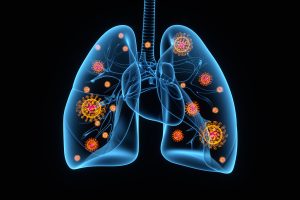Long COVID's most common symptom is revealed
Two months after being diagnosed, more than half of sufferers had this symptom


With more people suffering from COVID-19 symptoms months after being diagnosed, it seems long COVID is becoming more prevalent.
As stated by the NHS, COVID-19 symptoms vary and can even be mild or non-existent for some sufferers, but for others, symptoms such as fatigue, breathlessness, and pain can endure for months.
Known as long COVID, this condition may not have a medical definition, but it has been receiving greater recognition. Many sufferers continue to battle long-term consequences amidst huge uncertainty.
This article is for general interest and is not intended to suggest a course of action that might be suitable for you. Always consult a licensed healthcare professional before making decisions concerning your health and wellbeing.
What are long COVID symptoms?
- Fatigue
- Breathlessness
- Persistent Cough
- Joint Pain
- Muscle Aches
- Headaches
- Hearing and eyesight problems
- Loss of taste and smell
Amongst these common symptoms, perhaps the most common feature evident in those suffering from long COVID is chronic fatigue.
A study of patients in Rome has suggested that 87% had at least one symptom of COVID-19 two months after they were diagnosed. More than half reported one common sign of ‘long COVID’ in particular - crippling fatigue.
Why does the virus cause fatigue?
Professor David Strain of the University of Exeter runs a Chronic Fatigue Syndrome Clinic and recently told the BBC: ‘we’ve got no doubt long COVID exists.’
Doctors have also not yet found any link between the severity of the COVID-19 infection and fatigue. They are also yet to determine exactly how the virus is causing long COVID.
Sign up to our free daily email for the latest royal and entertainment news, interesting opinion, expert advice on styling and beauty trends, and no-nonsense guides to the health and wellness questions you want answered.

Professor Strain went on to explain, "The theory I'm working on is a premature ageing of the small blood vessels that deliver oxygen and nutrients to the tissues."
Though more research is needed to identify why COVID-19 causes chronic fatigue in particular. He warned that ‘it is difficult to figure out treatments’ until the cause of long COVID is identified.
Will sufferers fully recover?
With so much still unknown, it is difficult to establish if long COVID suffers will fully recover without more long-term data.
Professor Strain explained, "If long COVID follows the same pattern I'd expect some recovery, but if it takes just another coronavirus infection to react then this could be every winter."
The World Health Organisation has also warned that widespread inflammation caused by the virus could possibly lead to people experiencing heart problems at a much younger age than before.
What can you do if you are experiencing intense fatigue?
If you find your recovery is taking longer than you might expect, speaking to your GP or seeking other professional medical guidance is always advisable.
The NHS’s Your Covid Recovery Plan is another useful tool. It recommends following the ‘three Ps’ to help conserve energy and manage daily activities.
- Pace yourself and ensure you have plenty of rest
- Plan your week to ensure tiring activities are spaced out
- Prioritise what needs to be done urgently and what can wait
Stay safe, all.
Emma is a Royal Editor with eight years experience working in publishing. She specialises in the British Royal Family, ranging from protocol to outfits. Alongside putting her royal knowledge to good use, Emma knows all there is to know about the latest TV shows on the BBC, ITV and more. When she’s not writing about the latest royal outing or unmissable show to add to your to-watch list, Emma enjoys cooking, long walks and watching yet more crime dramas!
